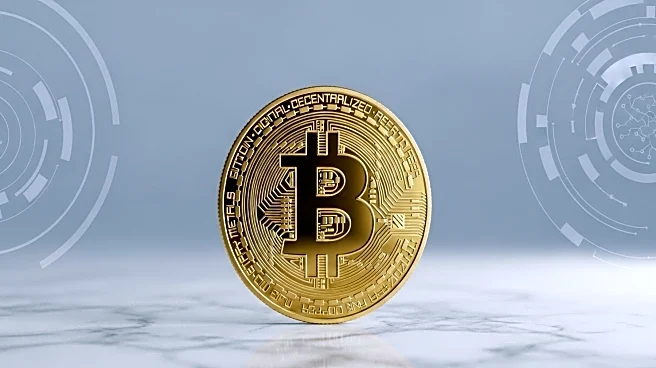What is the story about?
What's Happening?
Central banks, including the Federal Reserve, could soon become significant buyers of Bitcoin, according to the Deutsche Bank Research Institute. Historically, these institutions have favored conservative reserves like gold and Treasurys. However, the establishment of a U.S. strategic Bitcoin reserve in March may catalyze a shift towards digital assets. Deutsche Bank anticipates Bitcoin gaining legitimacy alongside gold as a federal holding over the next five years. The report suggests that Bitcoin's potential as a store of value and its low correlation to traditional assets make it an attractive option for central banks diversifying their reserves.
Why It's Important?
The potential adoption of Bitcoin by central banks as a reserve asset could transform its role in global finance, enhancing its legitimacy and stability. As central banks diversify their reserves, Bitcoin's integration could drive broader acceptance and influence its price dynamics. This shift may also impact monetary policy, as digital assets become part of strategic financial planning. The move towards Bitcoin reflects changing attitudes towards cryptocurrencies, highlighting their potential to coexist with traditional assets in institutional portfolios.
What's Next?
As central banks consider Bitcoin as a reserve asset, the cryptocurrency's adoption could accelerate, influencing its market value and investor interest. The establishment of a U.S. strategic Bitcoin reserve may prompt other countries to follow suit, potentially reshaping global financial systems. The integration of Bitcoin into central bank reserves could lead to regulatory developments, as institutions navigate compliance and security challenges. This trend may also drive innovation in digital asset management and infrastructure, supporting the broader crypto ecosystem.
Beyond the Headlines
The potential for Bitcoin to become a central bank reserve asset underscores its evolving role in global finance. As digital assets gain acceptance, they challenge traditional notions of value and investment, prompting shifts in financial strategies. The integration of Bitcoin into central bank reserves highlights the growing convergence of digital and traditional finance, offering new opportunities for innovation and growth. This development may also influence public perception of cryptocurrencies, enhancing their legitimacy and stability.














